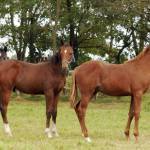Insulin Status and Developmental Orthopedic Disease in Horses

The relationship between insulin status and the occurrence of osteochondrosis in Thoroughbred yearlings was studied by a team from the University of Queensland Equine Research Unit.
Fasting blood samples were taken from 191 yearlings born on four farms in 2007 and 2008. Plasma insulin and glucose concentrations were determined and radiographs were taken to identify skeletal abnormalities.
Analysis of the radiographs showed that 27% of yearlings showed osteochondrosis lesions and 48% had no abnormalities. More males than females showed signs of osteochondrosis.
Plasma glucose concentrations were not different between the two groups, but lower fasting insulin concentrations were found in yearlings with osteochondrosis than in those with no abnormalities. Results were correlated with blood analyses done for the same horses at two and five months old, and also for their dams during late gestation. Insulin levels were low in the samples taken from the foals that developed osteochondrosis as yearlings.
Mares that produced foals that developed osteochondrosis as yearlings had significantly higher plasma glucose levels and body condition scores during gestation compared to mares that produced foals without skeletal abnormalities. The results suggest that low insulin levels in young foals may be related to the development of osteochondrosis, and the influence of maternal nutrition may affect metabolism and skeletal development in foals.
In another study using the same group of horses at the University of Queensland, researchers tried to clarify the association of insulin and other metabolic hormones with osteochondrosis. They found that high insulin-like growth factor 1 (IGF1) concentrations in fasted yearlings seemed to be associated with osteochondrosis. However, it is possible that the high level of IGF1 is caused by joint repair functions in young horses with joint lesions rather than being a cause of the formation of joint lesions.








